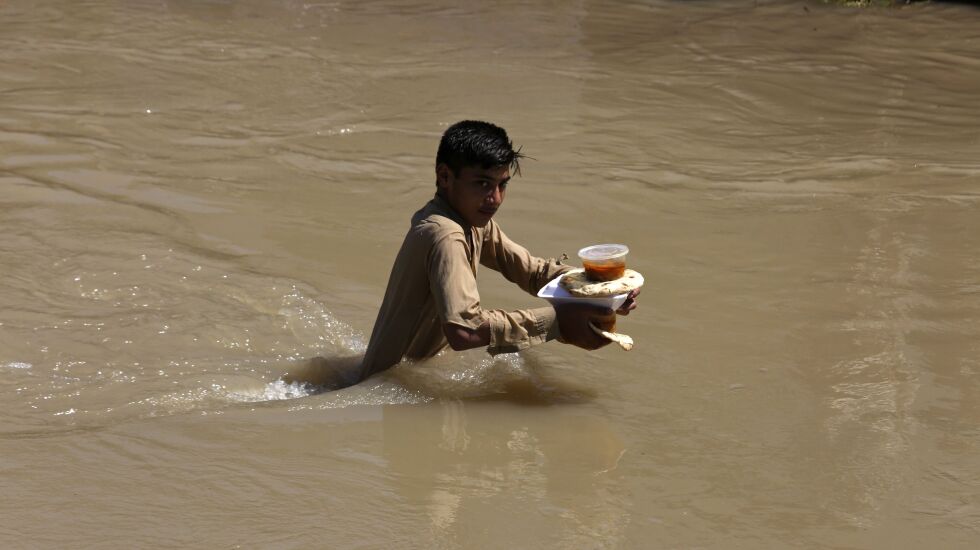
My dad was visibly irritated as he stared at the 105.6-carat oval diamond with its placard describing the British monarchy’s take on how the Koh-i-Noor ended up in England and, eventually, in the Queen Mother’s Crown.
“Gift from India? Liars!” his voice rose in Urdu, scaring away other tourists in the Tower of London that summer afternoon in 1988. “They stole it and have the nerve to call it a gift!”
With Queen Elizabeth II’s recent death at 96, many people — mostly Black and Brown — here and abroad have been calling for the return of the Koh-i-Noor, Great Star of Africa and other rare gems that were plundered from the former British colonies still reeling from the trauma of subjugation. The end of the queen’s seven-decade reign, albeit ceremonial, should be a time of deep reflection and an opportunity for the monarchy to make amends for its past sins, the critics contend.
I’ll keep a stiff upper lip waiting for that to happen.
After Elizabeth is laid to rest, her son Charles will be officially coronated king with his wife Camilla by his side, likely wearing the crown that showcases the Koh-i-Noor.
Before landing in the hands of the British, the Koh-i-Noor, which means “mountain of light” in Persian, had a home in present-day Pakistan. There, in 1849, the Maharaja of Punjab, a 10-year-old Duleep Singh, was forced to sign a document relinquishing his kingdom in Lahore, along with the diamond.
The tragedy that has been unfolding in Pakistan over the last several months is even more horrific, and another example of how the actions of economically stronger and more powerful nations, however unintentional, can have a crushing impact.
About one-third of the country has been submerged in water due to heavy monsoon rains and glacial melting, claiming the lives of over 1,500 so far and displacing more than 33 million.
There is no question that global warming caused by greenhouse gas emissions intensified the floods, scientists concluded.
Eighty percent of the current emissions come from the world’s wealthiest and largest developing nations, including the United States, United Kingdom and neighboring India, according to U.N. Secretary-General Antonio Guterres.
Pakistan, which is responsible for less than 1% of the world’s greenhouse gas emissions, is solely a victim of this grave case of “climate injustice.”
The South Asian country “is paying the price of something that was created by others,” Guterres said, arguing that privileged countries have a moral obligation to help in the recovery process, which is estimated to cost $30 billion.
Even if the British monarchy gave the Koh-i-Noor to Pakistan, it would be chump change, not to mention cause for international tension. Pakistan has not been a part of India since 1947, and two other countries, Iran and Afghanistan, have also claimed ownership of the diamond.
There are other ways to help.
Many Chicago-area mosques, local aid groups and larger charities, including Islamic Relief USA and UNICEF, are raising money to help Pakistan, where organizations like the Ali Hasan Mangi Memorial Trust and Edhi Foundation are doing the same.
“The international community has been very supportive, but at the end of the day it is the Pakistanis who have to fix things,” my friend and journalist Kamal Siddiqi said.
It is disappointing the natural disaster hasn’t received as much media attention as it deserves.
Such catastrophic flooding in the U.S. or Europe would elicit more sympathy, vociferous discussions on climate change and flag filters on Facebook profile pictures.
Then again, our country has its share of science-deniers.
Daniel Horton, as assistant professor at Northwestern University’s Department of Earth and Planetary Sciences, says individuals can’t fix the environment on their own.
“We need systematic change, and frankly, things need to happen fast,” he said, applauding the landmark climate change and health care bill President Joe Biden signed into law last month.
Floodwaters have started to recede in Pakistan’s worst-hit southern Sindh province, but the situation is certain to remain grim for awhile.
With the colder months looming, the obliteration of livestock and crops and a rise in waterborne diseases, the South Asian nation is bracing for hunger and health crises.
Most Pakistanis were not born into riches like Elizabeth or even Duleep Singh. That doesn’t mean they are expendable. As English writer and doctor Thomas Browne noted, “Rough diamonds may sometimes be mistaken for worthless pebbles.”
If we drown out Pakistan in its time of need — especially when we bear some of the blame — we’ll only be opening the flood gates for more human misery.
Rummana Hussain is a columnist and member of the Sun-Times Editorial Board.
Want to write a letter to the editor or an op-ed? Check out our guidelines.





